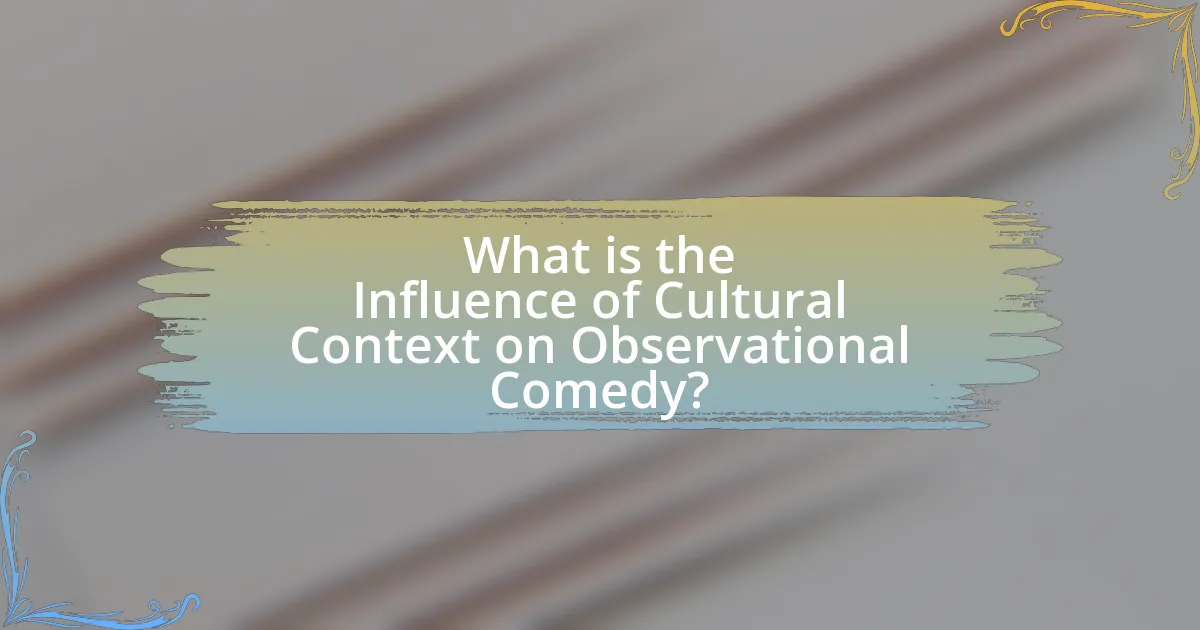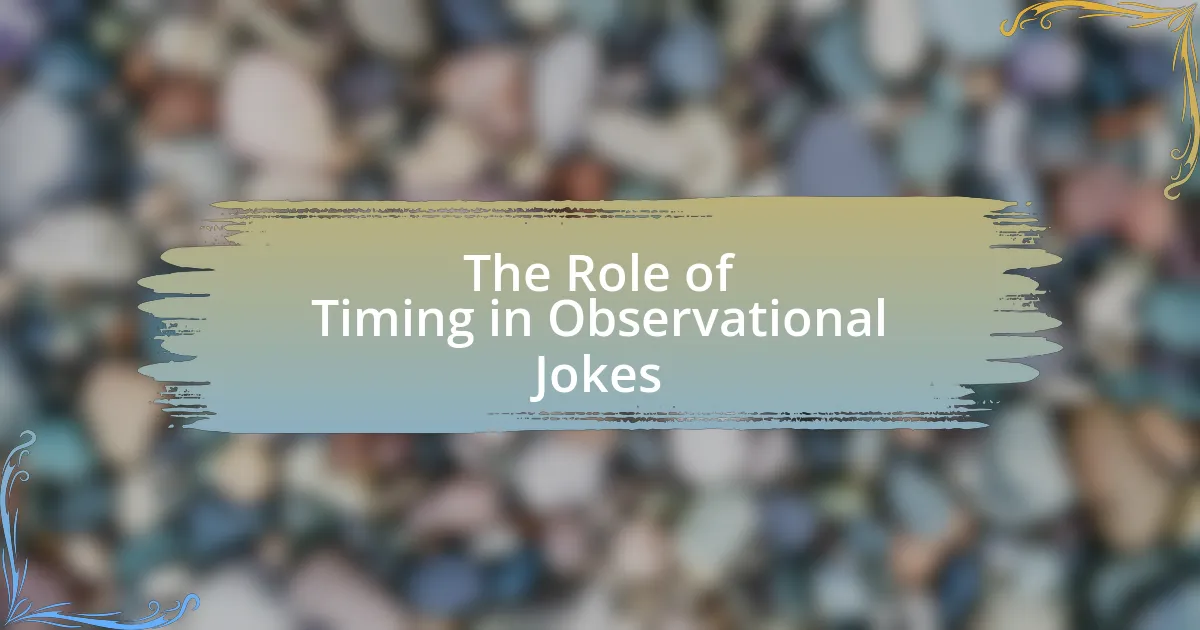The article examines the significant influence of cultural context on observational comedy, highlighting how comedians tailor their material to resonate with specific audiences through shared experiences, societal norms, and cultural references. It discusses the impact of language, social norms, and historical context on comedic themes, as well as the varying reception of humor across different cultures. Additionally, the article addresses the risks comedians face when ignoring cultural sensitivities, the ethical considerations surrounding cultural appropriation, and practical strategies for effectively incorporating cultural context into comedic performances. Overall, it emphasizes the importance of understanding cultural nuances to enhance comedic effectiveness and audience engagement.

What is the Influence of Cultural Context on Observational Comedy?
Cultural context significantly influences observational comedy by shaping the themes, references, and humor styles that resonate with audiences. Comedians often draw from shared cultural experiences, societal norms, and local idiosyncrasies to create relatable content. For instance, British observational comedians like Ricky Gervais utilize dry humor and irony, reflecting the UK’s cultural nuances, while American comedians like Jerry Seinfeld focus on everyday life scenarios that resonate with American audiences. This cultural specificity enhances the comedic impact, as humor is often rooted in the audience’s understanding of their own cultural context, making it essential for comedians to tailor their material accordingly.
How does cultural context shape the themes in observational comedy?
Cultural context significantly shapes the themes in observational comedy by influencing the subjects comedians choose to explore and the perspectives they adopt. Comedians often draw from their own cultural backgrounds, societal norms, and shared experiences, which allows them to resonate with audiences familiar with those contexts. For instance, a comedian from a specific cultural background may highlight everyday situations that reflect the values, traditions, or challenges unique to that culture, making the humor relatable and poignant. Research indicates that humor is often rooted in cultural references and social commentary, as seen in the works of comedians like Dave Chappelle and Ali Wong, who address race, identity, and family dynamics through the lens of their respective cultural experiences. This connection between cultural context and comedic themes enhances the audience’s engagement and understanding, making observational comedy a powerful medium for reflecting societal realities.
What are the key cultural elements that influence comedic themes?
Key cultural elements that influence comedic themes include language, social norms, historical context, and shared experiences. Language shapes humor through wordplay, puns, and dialects, while social norms dictate what is considered acceptable or taboo, influencing the boundaries of comedy. Historical context provides a backdrop for jokes, allowing comedians to reference events or societal changes that resonate with audiences. Shared experiences, such as cultural traditions or collective memories, create a common ground for humor, making it relatable. For instance, comedians often draw on cultural stereotypes or local customs to craft jokes that resonate with specific audiences, demonstrating how these elements shape comedic expression.
How do societal norms affect the reception of observational comedy?
Societal norms significantly influence the reception of observational comedy by shaping audience expectations and interpretations of humor. Observational comedy often relies on relatable experiences and social commentary, which can vary widely across different cultures and communities. For instance, a joke that critiques a specific cultural practice may resonate positively in one society while being deemed offensive in another, as seen in the varying reception of comedians like Jerry Seinfeld and Ali Wong, who tailor their material to reflect their cultural backgrounds. This variance illustrates how societal norms dictate what is considered acceptable or humorous, impacting comedians’ ability to connect with their audiences.
Why is cultural context important for comedians?
Cultural context is important for comedians because it shapes the audience’s understanding and reception of humor. Comedians rely on shared experiences, values, and social norms to create relatable content; without this context, jokes may fall flat or be misinterpreted. For instance, a study by the University of California found that humor that resonates with cultural references significantly enhances audience engagement and laughter, demonstrating that cultural familiarity is crucial for effective comedic delivery.
How does understanding cultural context enhance comedic performance?
Understanding cultural context enhances comedic performance by allowing comedians to tailor their material to resonate with their audience’s shared experiences and values. When comedians incorporate cultural references, they create a connection that makes the humor more relatable and impactful. For instance, research by the University of California found that jokes referencing specific cultural norms or events are perceived as funnier by individuals familiar with those contexts, demonstrating that cultural relevance significantly boosts comedic effectiveness.
What risks do comedians face when ignoring cultural context?
Comedians face significant risks when ignoring cultural context, including potential backlash, loss of audience, and damage to their reputation. When comedians fail to consider the cultural nuances of their material, they may inadvertently offend specific groups, leading to public outrage or social media backlash. For instance, jokes that rely on stereotypes can perpetuate harmful narratives, alienating audiences and resulting in decreased ticket sales or social media engagement. Additionally, comedians may find themselves facing professional consequences, such as being dropped by agents or losing opportunities for future performances. Historical examples, such as the backlash faced by comedians like Michael Richards after racially charged remarks, illustrate the tangible repercussions of neglecting cultural sensitivity in humor.

How do different cultures perceive observational comedy?
Different cultures perceive observational comedy through the lens of their unique social norms, values, and experiences. For instance, in Western cultures, observational comedy often highlights everyday life and personal anecdotes, resonating with audiences who appreciate relatability and self-deprecation. In contrast, cultures in Asia may focus on collective experiences and social harmony, leading to humor that emphasizes group dynamics and avoids individual criticism. Research indicates that humor styles vary significantly across cultures; for example, a study published in the Journal of Cross-Cultural Psychology by Matsumoto and Hwang (2013) found that individualistic societies favor humor that promotes personal expression, while collectivist societies prefer humor that reinforces social bonds. This cultural context shapes how observational comedy is crafted and received, influencing both the content and delivery of comedic performances.
What are the variations in humor across cultures?
Variations in humor across cultures manifest in differing styles, themes, and social contexts. For instance, Western cultures often emphasize individualism and self-deprecation in humor, while collectivist cultures, such as those in East Asia, may prioritize group harmony and avoid humor that could offend others. Research by Robert Provine in “Laughter: A Scientific Investigation” highlights that laughter is a universal human behavior, yet the triggers for laughter can vary significantly; what is considered funny in one culture may be seen as inappropriate or confusing in another. Additionally, cultural references, language nuances, and societal norms shape comedic expressions, leading to distinct forms of humor, such as satire in Western contexts versus the use of puns and wordplay in cultures like Japan.
How do cultural values influence comedic styles?
Cultural values significantly influence comedic styles by shaping the themes, humor types, and delivery methods that resonate with audiences. For instance, in collectivist cultures, humor often emphasizes group harmony and shared experiences, while in individualistic cultures, humor may focus on personal anecdotes and self-deprecation. Research by Hofstede (1980) highlights how cultural dimensions, such as individualism versus collectivism, directly affect humor preferences and styles. In Japan, for example, subtlety and wordplay are valued, leading to a comedic style that relies on nuance, whereas in the United States, more direct and exaggerated humor is prevalent, reflecting a cultural preference for openness and assertiveness.
What examples illustrate cultural differences in observational comedy?
Cultural differences in observational comedy are illustrated by comedians like Jerry Seinfeld and Michael McIntyre. Seinfeld’s humor often reflects American cultural norms, focusing on everyday situations and social interactions that resonate with a U.S. audience, such as the nuances of dating and consumer behavior. In contrast, McIntyre’s observational comedy draws from British culture, emphasizing the quirks of British life, such as the weather and social etiquette, which may not translate as effectively to American audiences. This distinction highlights how cultural context shapes comedic themes and audience reception, as evidenced by the varying success of these comedians in different countries.
How does audience background affect comedic interpretation?
Audience background significantly affects comedic interpretation by shaping the context in which humor is understood. Factors such as cultural norms, social values, and personal experiences influence how jokes are perceived and appreciated. For instance, a study by Kuipers (2008) in “Cultural Sociology” found that humor that resonates with specific cultural references is more likely to be appreciated by audiences familiar with those references, while it may fall flat for those outside that cultural context. This indicates that shared background knowledge enhances the effectiveness of comedic material, as it allows audiences to connect with the humor on a deeper level.
What role does demographic diversity play in humor appreciation?
Demographic diversity significantly enhances humor appreciation by introducing varied perspectives and cultural references that resonate differently across groups. Research indicates that individuals from diverse backgrounds often find humor in different contexts, as humor is influenced by cultural norms, values, and experiences. For instance, a study published in the Journal of Cross-Cultural Psychology by Matsumoto and Hwang (2013) found that humor appreciation varies significantly across cultures, with certain jokes being more relatable to specific demographic groups due to shared experiences or cultural knowledge. This diversity allows for a richer comedic landscape, where humor can bridge gaps between different groups, fostering understanding and connection through shared laughter.
How can comedians tailor their material to diverse audiences?
Comedians can tailor their material to diverse audiences by understanding cultural nuances and preferences specific to each group. This involves researching the audience’s background, values, and humor styles, allowing comedians to create relatable content that resonates with different demographics. For instance, a study published in the Journal of Cross-Cultural Psychology highlights that humor often relies on shared experiences and cultural references, which vary significantly across communities. By incorporating local slang, cultural references, and relevant social issues, comedians can enhance audience engagement and ensure their material is both respectful and entertaining.

What are the challenges comedians face in cross-cultural observational comedy?
Comedians face significant challenges in cross-cultural observational comedy, primarily due to differing cultural norms, values, and humor perceptions. These differences can lead to misunderstandings or offense, as what is considered funny in one culture may be taboo or unrelatable in another. For instance, a joke that relies on specific cultural references may not resonate with audiences from different backgrounds, resulting in a lack of connection. Additionally, comedians must navigate language barriers, which can complicate the delivery and timing of jokes, essential elements in comedy. Research indicates that humor is deeply rooted in cultural context, making it crucial for comedians to adapt their material to suit diverse audiences while maintaining authenticity.
How do language barriers impact comedic delivery?
Language barriers significantly hinder comedic delivery by obstructing the audience’s understanding of jokes and cultural references. When comedians use language that is not fully grasped by their audience, the intended humor can be lost, leading to confusion or misinterpretation. For instance, a study published in the Journal of Cross-Cultural Psychology found that humor often relies on linguistic nuances and cultural context, which can vary widely across different languages. This indicates that comedians must adapt their material to ensure clarity and resonance with diverse audiences, as failure to do so can result in diminished comedic impact and audience engagement.
What strategies can comedians use to overcome language challenges?
Comedians can overcome language challenges by utilizing techniques such as code-switching, incorporating visual humor, and leveraging universal themes. Code-switching allows comedians to switch between languages or dialects, making their material accessible to diverse audiences. Visual humor, which relies on physical comedy and expressions, transcends language barriers and can effectively convey jokes. Additionally, focusing on universal themes, such as relationships or everyday experiences, ensures that the humor resonates across different cultural contexts. These strategies have been employed successfully by comedians like Trevor Noah, who navigates multiple languages and cultural references in his performances, demonstrating their effectiveness in bridging language gaps.
How does translation affect the essence of observational humor?
Translation significantly alters the essence of observational humor by shifting cultural references and nuances that are integral to the original context. Observational humor relies heavily on shared experiences and cultural specifics, which may not have direct equivalents in another language. For instance, a joke about a local custom or idiom may lose its impact or become entirely incomprehensible when translated, as evidenced by studies showing that humor often depends on cultural context (Attardo, 1994). This transformation can lead to a dilution of the humor’s effectiveness, as the subtleties that resonate with the original audience may not translate well, resulting in a loss of the intended comedic effect.
What ethical considerations arise in culturally influenced comedy?
Culturally influenced comedy raises several ethical considerations, primarily concerning cultural appropriation, sensitivity to marginalized groups, and the potential for reinforcing stereotypes. Cultural appropriation occurs when comedians use elements from a culture that is not their own, often without understanding or respecting its significance, which can lead to exploitation. Sensitivity to marginalized groups is crucial, as jokes that target specific communities can perpetuate harm and reinforce societal inequalities. Additionally, reinforcing stereotypes through humor can contribute to negative perceptions and social stigmas, impacting how individuals from those cultures are viewed in broader society. These ethical considerations highlight the responsibility of comedians to navigate cultural contexts thoughtfully and respectfully.
How can comedians navigate sensitive cultural topics responsibly?
Comedians can navigate sensitive cultural topics responsibly by prioritizing empathy and understanding the cultural context of their material. This involves researching the backgrounds and experiences of the communities they are addressing, ensuring that their jokes do not perpetuate stereotypes or harm marginalized groups. For instance, comedians like Hasan Minhaj and Trevor Noah often draw from their own cultural experiences, which allows them to approach sensitive topics with authenticity and respect. Studies show that humor can foster dialogue and understanding when it is rooted in genuine experiences rather than mockery, highlighting the importance of context in observational comedy.
What are the consequences of cultural appropriation in comedy?
Cultural appropriation in comedy can lead to significant backlash, including public outrage and loss of audience trust. When comedians use elements from marginalized cultures without understanding or respecting their context, it can perpetuate stereotypes and reinforce systemic inequalities. For instance, the 2018 controversy surrounding comedian Amy Schumer’s use of Asian cultural elements in her sketches highlighted how such actions can alienate audiences and provoke accusations of insensitivity. This backlash can result in diminished career opportunities and reputational damage for the comedian involved, as seen in cases where performers faced boycotts or calls for accountability.
What practical tips can comedians use to effectively incorporate cultural context into their observational comedy?
Comedians can effectively incorporate cultural context into their observational comedy by researching and understanding the cultural backgrounds of their audience. This involves studying cultural norms, values, and humor styles specific to different communities, which allows comedians to tailor their material to resonate with those audiences. For instance, comedians like Hasan Minhaj and Trevor Noah often draw from their own cultural experiences, using personal anecdotes that reflect broader societal issues, thus creating relatable content that engages diverse audiences. Additionally, comedians should remain sensitive to cultural nuances and avoid stereotypes, as this fosters respect and connection with the audience. By blending personal experiences with cultural insights, comedians can create humor that is both relevant and impactful.
How can research enhance a comedian’s understanding of cultural nuances?
Research can enhance a comedian’s understanding of cultural nuances by providing insights into the values, beliefs, and social dynamics of different communities. By studying cultural contexts, comedians can identify what resonates with specific audiences, allowing them to craft material that is both relatable and respectful. For instance, research on cultural stereotypes and humor, such as the work by Peter McGraw and his “benign violation theory,” illustrates how humor can be derived from the balance between violating social norms and maintaining a level of safety for the audience. This understanding enables comedians to navigate sensitive topics more effectively, ensuring their jokes are well-received rather than offensive.
What role does audience feedback play in refining culturally relevant material?
Audience feedback is crucial in refining culturally relevant material as it provides insights into the perceptions and interpretations of diverse cultural contexts. This feedback allows creators to understand which elements resonate with audiences and which may be misinterpreted or deemed offensive. For instance, a study by the University of Southern California found that comedians who actively sought audience input were able to adjust their material to better reflect cultural sensitivities, resulting in increased audience engagement and satisfaction. Thus, audience feedback serves as a vital tool for creators to enhance the cultural relevance and appropriateness of their content.





